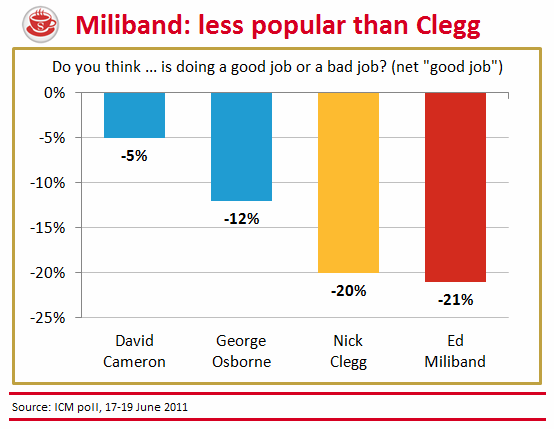We haven’t dwelt on the polls very much on Coffee House recently, although we have flagged up some nuggets on Twitter. Here are some of the measures of public opinion that provide an interesting backdrop to Westminster’s machinations:
Labour in trouble despite poll leads
Two weeks ago I reported on a poll that showed the extent of Ed Miliband’s unpopularity. There have since been a few more polls to compound his unease. ICM found that he had worse approval ratings even than Nick Clegg:

YouGov find that 58 per cent of the public think he’s doing a bad job, but perhaps more worrying for “Red Ed” is that he even has negative ratings among the very people who won him the leadership election: trade union members. 47 per cent of them say he’s doing a bad job, compared to just 41 per cent who think he’s doing well.
And Miliband’s not the only Labour Ed whose popularity is dwindling. In January, the public were evenly split on which of Osborne and Balls would make the better Chancellor. Now Osborne has a 7 point lead. When it comes to managing the economy, 41 per cent trust Cameron, Clegg and Osborne the most, compared to just 23 per cent who put their faith in the two Eds.
Perhaps the worst aspect of Labour’s performance is their failure to shift the blame for the spending cuts to the coalition. The cuts are very unpopular, but just 24 per cent think the coalition is most to blame, while 40 per cent blame Labour the most (a further 24 per cent blame both equally). Labour have made no progress on this front since the beginning of the year:

The NHS and U-turns
According to YouGov, 61 per cent approve of the government’s decision to change their NHS reform plans; just 16 per cent disapprove. In addition, ComRes find that half of the public think that “Nick Clegg deserves some credit” for the changes, even though only 1 in 10 say that Liberal
Democrat MPs were most responsible for them.
On U-turns in general, YouGov suggest that there’s some support for the government’s claim that U-turns are a sign of strength. 39 per cent agree, against 37 per cent who think it shows the government is “weak, incompetent or hadn’t though through their policies”. However, 1 in 3 say that recent changes in policy have worsened their view of Cameron and the coalition, while just 1 in 5 say their opinion has improved as a result.
Strikes
Ipsos MORI find the public evenly split on the unions’ decision to strike. However, ComRes show hostility to different unions coordinating the timing of the strikes: 44 per cent think they shouldn’t be allowed to do so, while
just 34 per cent disagree. The vast majority of the public also supports the idea of requiring a certain
level of participation in ballots before a strike can be called.
As far as the success of the strikes is concerned, the public is pretty sceptical. Three times as many think the strikes “stand no chance of succeeding” than disagree, while an even greater majority think that there won’t be much sympathy for strike action “because everyone has to shoulder the burden of cuts”. Populus suggest that while the majority of the public would have sympathy for the likes of nurses or fire fighters if they went on strike, much fewer are sympathetic towards flight attendants, tube drivers and civil servants.
Boris in good shape for re-election
According to YouGov, Boris leads Ken 49-41 in head-to-head polling, despite the fact that 51 per cent of Londoners would vote for Labour if there were a general election tomorrow, compared to just 32 per cent for the Tories. The reason for Boris’ lead? While he has the support of 84 per cent of Conservative voters, Ken has the support of just 63 per cent of Labour ones. A full fifth of Labour voters say they would rather have Boris as mayor than Ken.
Interestingly, in terms of which qualities the two men possess, Boris only beats Ken in charisma and honesty. On all the other characteristics, including “natural leader”, “strong” and “good in a crisis”, the current mayor trails his predecessor significantly:







Comments